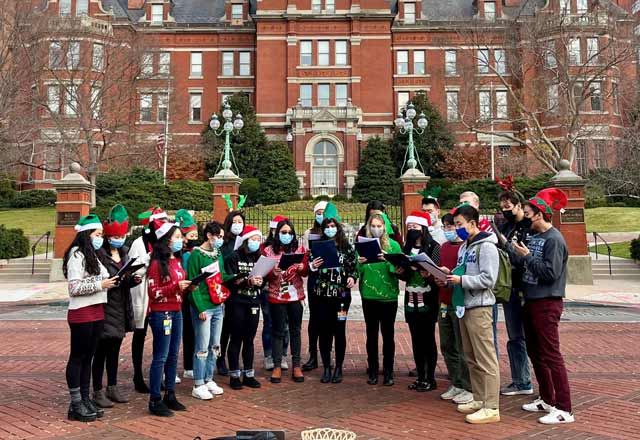Photo courtesy of author.
Evenings at the Armstrong Medical Education building are usually quiet, with students at home or scattered between classrooms for late-night studying. On a recent Wednesday, however, several students stepped out of their study rooms to an unusual sound: the soaring lines of Ariana Grande’s hit song, “Greedy”, performed by the School of Medicine’s a cappella group, the Synaptic Clefs. I’m a soprano in the group, and in our online debut, the Synaptic Clefs (affectionately known as Sync-C) were being featured on the Johns Hopkins Medicine Alumni Instagram page for a livestream set.
As a second-year medical student, I started medical school with the COVID-19 pandemic in full swing. There were limited opportunities to meet my classmates, much less gather together to make music. By the time the 2021 academic year started, however, students had consistently been vaccinated and it was safer for student organizations to meet in person. In August of 2021, the current M1 class came to Hopkins with new energy and ideas to revitalize the student arts scene. Justin Huang, Christian Hopkins, Annabelle Pan, and Joyce Cheng formed the Synaptic Clefs Executive Board, which then organized a round of Zoom auditions to finalize the 20-person group. Members of the group brought extensive a cappella and music experience to the ensemble. Our current director Justin Huang was a member of the Hopkins undergraduate community service a cappella group, the Notes of Ranvier, and founded the Hopkins Inter-A Cappella Council. Our co-director and beatboxer, Christian Hopkins, sung with Project Philly, and soprano Kowsar Ahmed founded the Melanotes, JHU’s only R&B, hip hop, and rap a cappella group. For two years of college I was the director of my school’s South Asian fusion a cappella group, although I didn’t have any prior formal training. During the pandemic, I started taking private voice lessons on Zoom, and I was excited to bring these new skills to Sync-C.
Being a part of a cappella in medical school has meant adapting to evolving situations. Without the traditional performance outlets available to undergraduate groups, and with the safety level of in-person events constantly fluctuating, we started rehearsing without a clear view of what the trajectory of our group would be. Medical students often have their attention pulled in myriad directions as we try to balance coursework with clinical experiences, research, shadowing, academic organizations and more. But the joy of Sync-C has been seeing how everyone has set aside time in their busy schedules simply to make music together. The communal love of music in the group is apparent, from the ecstatic energy we emit after finishing a successful run of a song to the improvising we do together between rehearsing. For me, our Instagram Live show resurfaced my distant memories of the euphoria of performing; our soloists amped up their energy, executing complicated runs and sizzling choreography; the ensemble sharpened their focus to hit all the notes and adjust to the interpretation of the soloists. Sync-C has been a valuable opportunity to for me to make friends with both first and second years as we engage with the musical aspects of our brains rather than the medical.
As I transition from my pre-clinical work to the hospital wards next month, I am in a way starting my professional life. The advice I’ve heard from mentors is that holding on to things outside of medicine that are important to you during this transition isn’t organic – it requires constant effort. I’m not sure how much I will be able to contribute to Sync-C while I’m on the wards; I will have to whittle away some parts of myself to stay afloat. But my experience with the group has helped me recognize that there is ebb and flow: that out of a pandemic year, a new, talented group could be born, and after only singing over Zoom for two years, I would unexpectedly have the opportunity to apply these new skills in my M2 year. Singing with Sync-C has reminded me of the rewards that the concerted effort to maintain my non-medical identity can bring, and the group has given me the tools to do this as best I can as I move forward in my career.
Follow Synaptic Clefs on Instagram to see what the group is up to and to contact us about performance opportunities: @synapticclefs
Events:
Livestream Recording: https://www.instagram.com/tv/CaD4tdIphpW/?utm_medium=copy_link
Feb 26th-27th - Sync-C Recording Weekend (Spotify release date coming!)
May – Sync-C Performance at Johns Hopkins Medicine White Coat Ceremony
Related Content
- Lessons from Pre-clinical Medical Education
- School of Medicine’s Student-Led Group Brings Joy Through Music
- Graduate Student Finds a Harmonious Work-Life Balance with Music
- Music As a Source of Healing: Drawing Inspiration for Medicine
Want to read more from the Johns Hopkins School of Medicine? Subscribe to the Biomedical Odyssey blog and receive new posts directly in your inbox.
